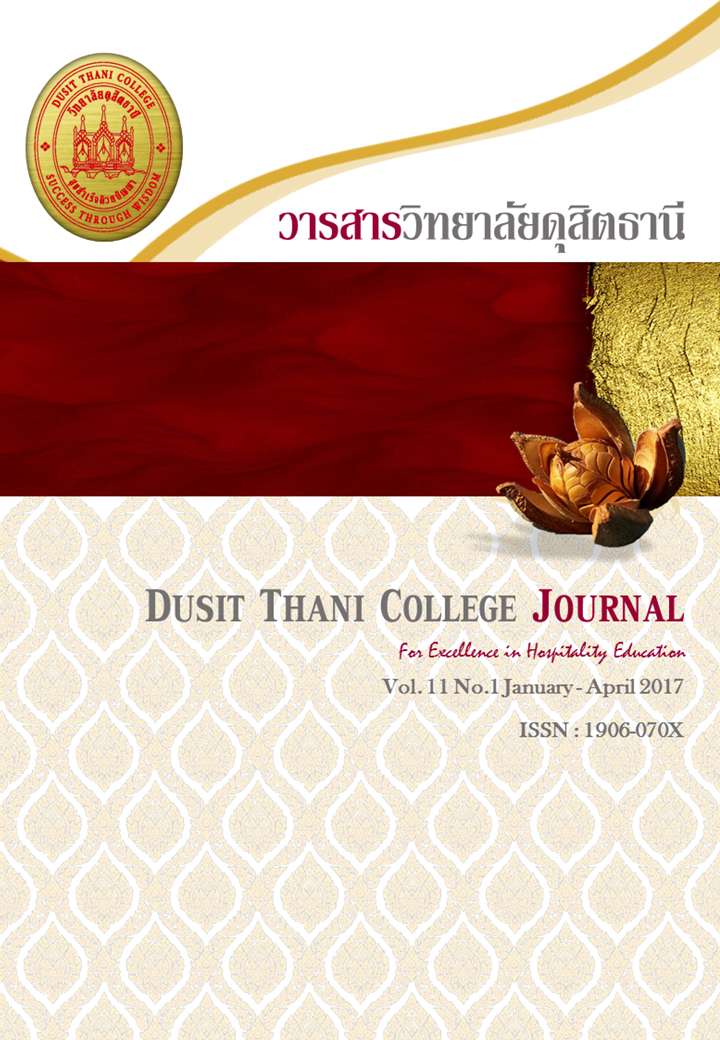การสร้างและการปรับเปลี่ยนวัฒนธรรมสู่การเป็นสินค้าทางการท่องเที่ยวของชาวมอญ เกาะเกร็ด จังหวัดนนทบุรี
Main Article Content
บทคัดย่อ
การวิจัยนี้มีวัตถุประสงค์เพื่อศึกษาถึงการสร้างและการปรับเปลี่ยนวัฒนธรรมของชาวมอญเกาะเกร็ดให้กลายเป็นสินค้าทางการท่องเที่ยว โดยใช้กระบวนการวิจัยเชิงคุณภาพ เก็บรวบรวมข้อมูลจากการศึกษาเอกสารและงานวิจัยที่เกี่ยวข้อง การสังเกต การสัมภาษณ์แบบไม่เป็นทางการ การสัมภาษณ์แบบเจาะลึก ผู้ให้ข้อมูลประกอบด้วย ปราชญ์ชาวบ้าน ผู้ประกอบการร้านอาหาร ผู้ผลิตเครื่องปั้นดินเผา ซึ่งเป็นชาวมอญในตำบลเกาะเกร็ด และเจ้าหน้าที่องค์การบริหารส่วนตำบลเกาะเกร็ด ผลการวิจัยพบว่า มรดกทางภูมิปัญญาด้านอาหาร ศิลปหัตถกรรม มีการพัฒนาให้เข้ากับการท่องเที่ยวและความต้องการของลูกค้า แต่ยังเป็นการผลิตและจำหน่ายแบบพอเพียง สร้างรายได้ให้ครอบครัวสามารถดำรงชีพอยู่ได้ และมีการแบ่งหน้าที่กันทำตามความชำนาญ ส่วนวัฒนธรรมและประเพณีนั้น ชาวมอญยังคงธำรงรักษาไว้เป็นอย่างดี มีบางประเพณีได้ปรับให้เข้ากับยุคสมัย
Article Details
นโยบายการพิจารณากลั่นกรองบทความ
- บทความวิจัยและบทความวิชาการทุกเรื่องที่จะได้รับการตีพิมพ์ต้องผ่านการพิจารณากลั่นกรองโดยผู้ทรงคุณวุฒิ (Peer Review) ในสาขาที่เกี่ยวข้อง จำนวน 3 ท่าน/บทความ
- บทความ ข้อความ ภาพประกอบและตารางประกอบที่ลงตีพิมพ์ในวารสารเป็นความคิดเห็นส่วนตัวของผู้เขียน กองบรรณาธิการไม่จำเป็นต้องเห็นด้วยเสมอไป และไม่มีส่วนรับผิดชอบใด ๆ ถือเป็นความรับผิดชอบของผู้เขียนแต่เพียงผู้เดียว
- บทความที่จะได้รับการตีพิมพ์จะต้องไม่เคยตีพิมพ์ เผยแพร่ที่ใดมาก่อน และไม่อยู่ระหว่างการพิจารณาของวารสารฉบับอื่น หากตรวจสอบพบว่ามีการตีพิมพ์ซ้ำซ้อน ถือเป็นความรับผิดชอบของผู้เขียนแต่เพียงผู้เดียว
- บทความใดที่ผู้อ่านเห็นว่าได้มีการลอกเลียนหรือแอบอ้างโดยปราศจากการอ้างอิง หรือทำให้เข้าใจผิดว่าเป็นผลงานของผู้เขียน กรุณาแจ้งให้กองบรรณาธิการวารสารทราบจะเป็นพระคุณยิ่ง
เอกสารอ้างอิง
Chai Pothisita. (2009). Science and Art of Qualitative Research. 4th ed., Bangkok: Amarin Printing & Publishing Public Company Limited.
Cohen, E. (1988). “Authenticity and Commoditization in Tourism.” Annals of Tourism Research 15(3): 371-386.
Department of Tourism. (2013). Guide to quality assessment of cultural sites. Bangkok: Ministry of Tourism and Sports.
Ed Pirom. (2005). Koh Kret. 2nd ed., Nonthaburi: Screen Printing Co., Ltd.
Kanchana Saen Limsuwan and Saranya Saeng Limsuwan. (2012). “Sustainable Heritage Tourism.” Journal of Management. 32(4): 139-146.
MacCannell, D. (1973). “Staged Authenticity: Arrangements of Social Space in Tourist Settings.” American Journal of Sociology. 79(3): 589-603.
. (1976). The Tourist: A New Theory of the Leisure Class. London: Macmillan.
Meethan, K. (2001). Tourism in Global Society: Place, Culture, Consumption. Hampshire: Palgrave.
Paradee Yasothornsrikul. (2011). “Tourism and Commoditization.” University of the thai Chamber of Commerce Journal. 31(4): 136-148.
Phisan Boonrung. (2010). Pakkred Stories Uncovered. Modification # 1. Nonthaburi: The Office of Documentation and Information, Sukhothai Thammathirat Open University.
Pitak Noywangklang. (2005). The process of doing culture as a tourism product in the Northeast. Office National Cultural Commission, Ministry of Culture.
Prathom Hongsuwan. (2012). Editorial “When the e-san culture...becomes a commodity” In Newsletters Isan Institute of Art and Culture Mahasarakrm University. 1(3) March – April 2012, 2.
Ranee Esichaikul. (2014). Niche Tourism Management. Nonthaburi: The Office of the University Press, Sukhothai Thammathirat Open University.
Richards, G. (1996). Cultural Tourism in Europe. CAB International, UK: Wallingford.
Shafritz, Jay M., J. Steven Ott. (2001). “Of the Division of Labour.” Classics of Organization Theory. 5thed., USA: Thomson Learning.
Sudjai Kaewwaew. (2008). A Comparison of the Songkran Tradition of the Mon Community at Jedrew Sub-District, Ban Phaeo District, Samul Sakhon and the Mon Community at Ko Kret Sub-District, Pak Kret District, Nonthaburi. A thesis for the Degree of Master of Arts in Thai Studies, School of Liberal Arts, Sukhothai Thammathirat Open University.
Suphat Chantavanich. (1996). Qualitative Research Methodology. 6thed., Bangkok: Chulalongkorn University Press.
Surichai Wankeaw. (2009). Contemporary art and culture on diversity and confusion. Bangkok: Asian Institute Study Chulalongkorn University.
The local office at Koh Kret. (2016). A briefing document of the local office at Koh Kret, Amphoe Pak kret, Nonthaburi Province. Copy-book binding.
Timothy, Dallebn J. (2011). Cultural Heritage Tourism: An Introduction. Bristol: Channel View Publications.


